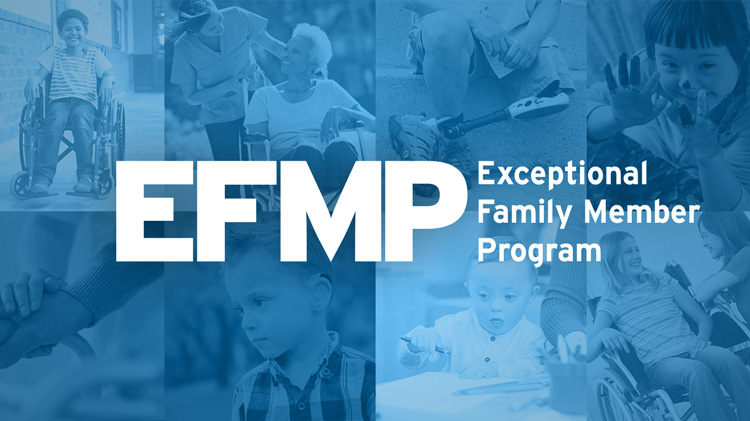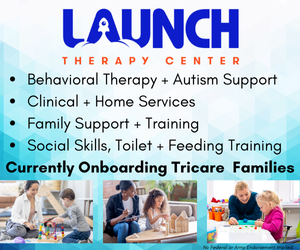- Systems Navigators. Systems navigators are ACS EFMP staff members available on most Army installations. They assist EFMP Families with navigating through the available systems of care.
- EFMP Newsletter. The Exceptional Advocate is the DoD’s EFMP newsletter, which includes helpful information and resources.
- Military OneSouce. Military OneSource’s EFMP & Me tool allows Families to explore the details of EFMP benefits and processes.
- DirectSTEP. DirectSTEP® eCourses are available for free to Soldiers and Family Members, Army EFMP staff, and Special Education staff associated with teaching military children. DirectSTEP® eCourses teach staff, parents, and educators how to handle critical education issues to obtain positive outcomes.
- Respite Care Support. The Army’s Respite Care Support services provide a temporary rest period for Family members responsible for regular care of persons with disabilities. Care may be provided in the EFM respite care user’s home.
- Center for Parent Information and Resources (CPIR). CPIR serves as a central resource of information and products to the community of Parent Training Information (PTI) Centers and Community Parent Resource Centers, so they can focus their efforts on serving Families of children with disabilities.
- American Camp Association (ACA). The ACA is a community of camp professionals who join together to share their knowledge and experience and ensure the quality of camp programs, including those for Exceptional Family Members.
- Who is an Exceptional Family Member (EFM)?
-
An EFM is a Soldier’s immediate Family member (child or adult), regardless of age, with any physical, emotional, developmental, behavioral, mental, or intellectual disorder that requires special treatment, therapy, education, training, or counseling on an on-going basis. The following are examples of common diagnoses for EFMP enrollment. The provided list is not all-inclusive, but only represents the most common diagnoses for enrollment.
- Asthma
- Attention Deficit Disorders
- Emotional Disorders
- Cerebral Palsy
- Down Syndrome
- Developmental Delays
- Spina Bifida
- Epilepsy
- Deafness
- AIDS
- Behavioral Health Disorders
- Orthopedically Impaired
- Speech Impaired
- Leukemia
- Diabetes
- Autism
- Heart Conditions
- Sickle Cell Disease
- Visual Impairment
- Hearing Impairment
- Learning Disabilities
- DirectSTEP® Training
- Air Force EFMP
-
If an Air Force member has a family member with special needs, they can receive help from the Exceptional Family Member Program. Special needs may include developmental delays, chronic medical/mental conditions and/or physical impairments. The EFMP ensures all active-duty families are located at bases that can provide the medical, mental health or educational services they need while allowing the Airman to meet the mission. Airmen coming to Fort Eisenhower can contact the Medical Liaison Technician in the GCHQ Bldg. 28423 at +1 (762)206-9015 with any questions in regards to EFMP or to help coordinate care.
- Respite Care
-
Respite care provides a temporary rest period for Family members providing care of persons with disabilities. Respite care is not an entitlement or guaranteed benefit – it is based on the availability of funding and the severity of the medical condition.
Required Forms:
- DA Form 5189 – Application for Respite Care
- DA Form 4700 – Supplemental Medical Data
- Systems Navigation
-
Systems Navigation connects Families with the systems of care they need, both on and off the installation. All EFMs are eligible for Systems Navigation. The Fort Eisenhower Systems Navigator is located in our EFMP office and is available at +1 (706)791-9707.
- Local Resources
-
- Richmond County Schools Special Education
- Columbia County Schools Special Services
- Aiken County Schools Special Programs
- Parent to Parent of Georgia
- Babies Can’t Wait
- School Liaison
- Augusta Magazine Camp Guide
- Augusta Magazine Special Kids Resource Guide
- Legal Support For EFMP Families
- Additional Legal Information
- Forms and Publications
-
- DD Form 2792 – Family Member Medical Summary
- DD Form 2792-1 – Special Education/Early Intervention Summary
- DA Form 7415 – EFMP Querying Sheet
- DA Regulation 608-75 – EFMP
- EFM PCS Checklist
- EFM Authorization to Transfer File
- Family Needs Assessment
- Extended Care Health Option (ECHO)


The Exceptional Family Member Program (EFMP) provides comprehensive support to Family members with special needs. An Exceptional Family Member is a Family member with any physical, emotional, developmental, or intellectual disorder that requires special treatment, therapy, education, training, or counseling, and meets the eligibility criteria. EFMP pertains to active-duty Soldiers, US Army Reserve Soldiers in the Active Guard Reserve (AGR) Program, and Army National Guard AGR personnel serving under authority of 10 USC or 32 USC. Department of the Army Civilians do not enroll in the program.
EFMP takes an all-inclusive approach to coordinating military and civilian community, educational, medical, housing, and personnel services to help Soldiers and their Families with special needs. Enrollment in EFMP includes a wide array of benefits, detailed in the EFMP Benefits Fact Sheet.
EFMP enrollment does not adversely affect promotions, schools, or assignments. EFMP information is not made available to selection boards.
Soldiers with Exceptional Family Members are required to register for EFMP and keep enrollment information current. That way, Family needs will be considered during the OCONUS assignments process. If you’re eligible for EFMP services, Family members must be screened and enrolled when they accompany authorized Soldiers on OCONUS assignments. Screenings include a medical records review for all Family members and developmental screening for all children 72 months and younger. (Special education needs are considered only in assignments outside the United States. Assignments within the US and its territories are not based on the educational needs of children.)
For more information about EFMP and helpful articles about the program, look at the Enterprise EFMP site. After that, contact the installation EFMP manager at your local Army Community Service (ACS) office. To learn more about medical enrollment, see the Program Overview.
EFMP Resources
Here are some helpful resources for EFMP Families.
(Government Links)
(Non-Government Links, No Endorsement Implied)



